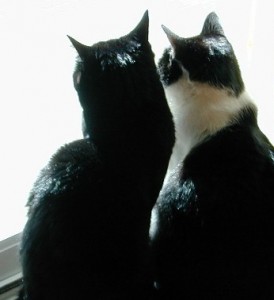It’s time to come out of the closet.
The sooner we admit to being a caregiver the sooner we can get help along the caregiving journey.
I was in denial for three years while being a long-distance caregiver for my widowed father–certainly not your poster child for self-identifying as a caregiver.
It wasn’t until after my husband and I moved my father into from his Wisconsin home of 45 years into our California home that we both realized, “Hey, this is for real!”
The feedback I received as I reached out for help, made me face the fact that I was indeed a “caregiver.”
Once I saw myself as a caregiver I was able to get the help I needed. Until then I was flailing wildly with uncertainty while trying to go on as if nothing had changed. But there was a big change in our lives! My father was living with dementia with us and we needed to keep him occupied otherwise he’d wander.
Yes, it’s time to come out of the caregiving closet and admit you’re a caregiver.
What were our options?
We learned about several to start with, including in-home care, adult day care, and support group. We wouldn’t have learned any of this if we didn’t accept that we are caring for someone.
The sooner you admit you’re a caregiver the sooner you too will start on the path of thriving and even finding the JOY in caregiving.
You’re not alone.
Brenda Avadian, MA
Alzheimer’s / Dementia Caregiver, Expert Spokesperson, Coach, and Author









I agree it is very important when one consciously accept our active role as caregivers. It gives you a new dimension of what is going on in your life. Because care giving for someone with Alzheimer is a total challenge. I have been caring for my mother for years but it made a big difference when I said so. I was in a meeting and was asked to introduce myself. I have been a educator for 30 years but none of that made sense. I presented myself as an “Alzheimer caregiver”. I came out of the closet!
WOW, how powerful that something in you put aside your 30 years of experience as an educator to finally label yourself as an Alzheimer’s caregiver.
Marisabel, thank you for emphasizing this VERY IMPORTANT point–once we admit we’re a caregiver–it will make the world of difference.
Thank you for talking about what it means to recognize that you’re a caregiver, this affects so many people there are thousands living with dementia and alzheimers and even more caregivers. Alzheimer’s Association’s Longest Day campaign is running right now, where they raise funds and honor the people with dementia and alzheimer’s and their caregivers. They’re working with hundreds of teams all over the country like this small business. http://bit.ly/alzld
Laura, thank you for your acknowledgment of the importance of self-identifying as a caregiver.
I hope you meet your goal with your “Buy with Cause” campaign. “$22 buys you a pair (2) of Movie Ticket Certificates …with a donation of 20% to the Alzheimer’s Association”
Thanks for this great post. Caregiver self-awareness is not often discussed but it is crucial to confidence and coping ability. Unfortunately, caregivers still face discrimination in the workplace so sometimes this becomes a reason to remain unidentified. But the NFCA reports incredible statistics about self-aware caregivers. They are more confident, more proactive, and more likely to be aware of common symptoms caregivers experience. Self-identified caregivers also help raise awareness of caregiving issues and help other caregivers cope.
So thanks again for this post!
Allie, thank you for such a thoughtful comment and for including NFCA’s findings.